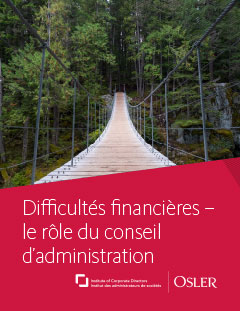Nouvelles diverses
Nouvelles diverses
Des dividendes en chute libre !
Ivan Tchotourian 2 septembre 2020 Ivan Tchotourian
Une nouvelle qui ne devrait pas étonnée : Les dividendes ont chuté de 22% dans le monde au second trimestre 2020, avec une baisse encore plus marquée en Europe, plombés par les effets de la pandémie de Covid-19 qui a fortement affecté les entreprises, selon un rapport publié ce lundi.
Le recul de 22% des dividendes « représente aisément la plus lourde chute trimestrielle depuis la crise financière mondiale », détaille ce rapport de la société de gestion Janus Henderson Investors, qui précise que « plus de la moitié » des entreprises « les ont purement et simplement supprimés ».
À la prochaine…
actualités internationales Gouvernance Nouvelles diverses
COVID-19 et risques : rapport du Forum économique mondial
Ivan Tchotourian 3 juin 2020 Ivan Tchotourian
Le Forum économique mondial vient de publier son nouveau rapport sur les risques globaux : « COVID-19 Risks Outlook – A Preliminary Mapping and Its Implications ».
Extrait :
Based on the perceptions of 350 of the world’s top risk professionals, a thorough analysis of early evidence and trends, and the collective knowledge of the Global Risks team and its partners (Marsh & McLennan and Zurich Insurance Group), the report identifies four key areas of concern:
- Economic Shifts: Emerging Risks from Structural Change
- Sustainability Setbacks: Emerging Risks from Stalling Progress
- Societal Anxieties: Emerging Risks from Social Disruptions
- Technology Dependence: Emerging Risks from Abrupt Adoption
Unsurprisingly, economic risks are regarded as the most challenging fallout from the pandemic, dominating companies’ risks perceptions. A prolonged global recession tops the list of most feared risks, closely followed by bankruptcy, industry consolidation, failure of industries to recover and a disruption of supply chains.
Alongside this, geopolitical disruption to business, in the form of policies that exploit COVID-19 to restrict the movement of people and goods, is another greatly feared risk. Couple these with concern of another infectious disease outbreak, an increase in cybercrime and the breakdown of IT infrastructure and networks, and the outlook fuels pessimism.
À la prochaine…
actualités canadiennes Base documentaire Gouvernance mission et composition du conseil d'administration Nouvelles diverses rapport
Difficultés financières – le rôle du conseil d’administration
Ivan Tchotourian 5 février 2020 Ivan Tchotourian
Le cabinet Osler vient de publier un intéressant rapport sur le rôle des CA lorsqu’une entreprise connaît de difficultés financières.
Osler et l’Institut des administrateurs de sociétés ont mené récemment un sondage ainsi qu’une table ronde sur la préparation des conseils d’administration en situation de difficulté financière. Les résultats révèlent un nombre surprenant de lacunes dans les pratiques de surveillance des conseils d’administration. Ces résultats font l’objet d’une analyse dans un nouveau rapport intitulé Difficultés financières – le rôle du conseil d’administration.
Je vous invite à lire les lacunes relevées et les façons permettant aux CA de mieux se préparer à composer avec les difficultés financières en prenant un certain nombre de mesures pendant que l’organisation est encore solvable, notamment :
Travailler de concert avec la direction pour établir des mesures régulières
Élaborer un plan de gestion des difficultés financières
Comprendre les options à la disposition d’une entreprise en situation de difficulté financière
La planification préalable offre plus de souplesse pour gérer les difficultés financières et entraîne de meilleurs résultats pour l’entreprise.
actualités internationales engagement et activisme actionnarial Gouvernance Normes d'encadrement Nouvelles diverses
Nouveau stewardship code en Angleterre !
Ivan Tchotourian 13 novembre 2019 Ivan Tchotourian
Le FRC vient de publier le nouveau Stewardship Code qui sera applicable dans quelques mois.
Extrait :
The UK Stewardship Code 2020 is a substantial and ambitious revision to the 2012 edition of the Code which takes effect from 1 January 2020.
The new Code sets high expectations of those investing money on behalf of UK savers and pensioners. In particular, the new Code establishes a clear benchmark for stewardship as the responsible allocation, management and oversight of capital to create long-term value for clients and beneficiaries leading to sustainable benefits for the economy, the environment and society.
There is a strong focus on the activities and outcomes of stewardship, not just policy statements. There are new expectations about how investment and stewardship is integrated, including environmental, social and governance (ESG) issues. The Code asks investors to explain how they have exercised stewardship across asset classes. For example, for listed equity, fixed income, private equity, infrastructure investments, and in investments outside the UK.
The Code consists of 12 Principles for asset managers and asset owners, and six Principles for service providers. These are supported by reporting expectations which indicate the information that should be publicly reported in order to become a signatory.
Organisations wanting to become signatories to the Code will be required to produce an annual Stewardship Report explaining how they have applied the Code in the previous 12 months. The FRC will evaluate Reports against our assessment framework, and those that meet the reporting expectations will be listed as signatories to the Code. To be included in the first list of signatories, organisations must submit a final report to the FRC by 31 March 2021.
À la prochaine…
